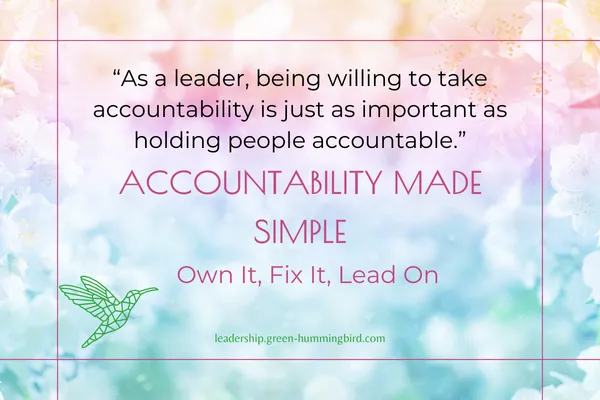
Accountability Made Simple: Own It, Fix It, Lead On
Theme: Accountability
Introduction
Accountability is hard for most people. We live in a world where to be honest about possible shortcomings is seen as evidence that you are not to be trusted, or that you should be punished for making mistakes. But “to err is human.” (We’ll talk more about the rest of that quote in another post). As a leader, being willing to take accountability is just as important as holding people accountable, in order to maintain trust and a healthy workplace culture.
Accountability is a multi-faceted word that encompasses just about every way responsibility can be taken, given, or assumed. It requires honesty in fact (what actually happened in the moment, as though you were watching from a camera) and truth (everything surrounding that event/incident and what that means to any stakeholders). Both of which are also important in leadership.
If you cannot start accountability in honesty, you are just lying and punishing people who do not deserve it.
Key Insights
Taking Accountability: stepping forward to take responsibility for a mistake or something that may have gone wrong. As a leader, this may mean taking responsibility for someone else’s mistake, with the justification that you didn’t catch it in time, train them well enough, or communicate expectations properly.
Being Accountable: publicly acknowledging your own mistakes. This shows that you are human and are willing to show grace to others who do the same (come to you with their mistakes, before you have to find it yourself).
Just as it is okay for your team members to occasionally make mistakes, so it is with you, as the leader. Pointing out to your team where you fell short and how you resolved the issue will:
give them an example as to how to proceed when it happens to them.
show them that you are a safe person to come to when they need help.
Holding Yourself Accountable: making sure that you stay on task and complete what is expected of you in a timely manner. Doing this in front of your team can set an example for them to do the same for themselves. This can be done by setting deadlines for yourself, and sharing with your team what standards and expectations you are creating for yourself.
Holding Others Accountable: Pointing out the mistakes of others, and working to resolve whatever issues arose from that mistake. This is probably the hardest part of leadership for many of us. When members of our team make mistakes that need to be addressed, at the very least in the hopes that they will learn something from it, it can be very uncomfortable. But it’s also necessary to ensure that the work is still done properly and that you are still respected as a leader by all on the team.
Positive Examples
Taking Accountability
I once had a former boss who would allow us to use him as the excuse when we had to deliver bad news to people we served. (Now whether he would actually back us up on that after the fact, if any of those people went to him, was a crapshoot.)
Being Accountable
I can’t think of any extremely specific positive examples of past leadership being accountable, but in this case, that’s a good thing! I KNOW I’ve experienced positive examples, but the thing is, they’re easy to forget when the implementation makes you feel so safe that you just don’t get the trauma that would cement it in your mind. But experiencing it was what taught me that I didn’t have to be on the defensive all the time. I didn’t need an excuse for everything. I just needed to be willing to admit I messed up and either I fixed it myself, or asked for help.
Holding Yourself Accountable
I DO remember having a former boss being very clear about the expectations she was setting up for herself, with us as well as with the Board (who were basically her bosses). She held herself to very high standards. This was a mixed bag for us as a team, because while she was transparent with us about these standards and where she fell short, it felt like a lot of pressure on the rest of us to achieve these high standards with her. Something to keep in mind: balance is key. Be transparent without overwhelming. Set realistic expectations for yourself as well as your team.
Holding Others Accountable
Until I was in a leadership position myself, I always took someone holding me accountable badly. I felt that, if I attempted to defend myself, I would get into more trouble, and still not be heard. Any time I tried to explain myself, the person responsible for holding me accountable would get defensive, themselves.
So when I was in the position responsible for holding someone else accountable, I took that memory into the experience with me, and entered every one of these situations with the question, “What can we learn from this?” I led with questions, and gave them the chance to tell me their story. I would genuinely listen to them, help them feel heard, and often work with them to brainstorm the next steps forward, as well as what they should have done, so that if it happens again, they know what to do.
What This Means for Neurodivergent Leaders
I don’t know if this element of my personality is strictly because of my neurodivergence, or if there were elements of past trauma, and/or the culture in which I was raised, in general, but I have always had a tendency to get defensive when confronted with any shortcomings. It is still my first reaction to having my mistakes pointed out to me, but I’ve learned to (mostly) keep it internal. It is something I work on every day.
Accountability is likely a shift in mindset for many of us (neurodivergent or not). If you have ever worked in a toxic workplace, you may have learned that it’s not safe to admit to any mistakes, and that “passing the buck” is the safest way to keep your job. As a leader, you need to break away from that mindset, and also have grace with your team members who may need to make that mindset shift due to past experiences, too.
Tips & Action Steps
I’ve worked with kids a lot in my past, and now raising my own, here’s a few things I try to teach them early, so that Accountability will be easier for them to handle when the stakes are higher than the playground. Here’s a few things I share with them so they have the right mentality going into these situations:
When you are caught making a mistake, don’t lie about it. Apologize.
If you are aware of the mistake, tell your leader immediately.
It’s better to own up to it (be accountable) right away, than to have your leader (or parent) stumble across it when they’re doing something else or frantically trying to get something else done. It is the difference between catching them in a good mood, or frustrating them even further.
For leaders demonstrating the importance of accountability to their team members who may have never learned what I mentioned above– or even those still learning it for themselves– here are some more specific tips:
Taking accountability: Part of leadership is standing up for your team members and taking responsibility for making sure they do better next time. I don't have any tips for this except to remember it. This is the mindset shift: In our culture, accepting blame is damaging to the ego. But being responsible is usually something to be proud of.
Holding yourself accountable: This can be done by setting deadlines for yourself, and sharing with your team what standards and expectations you are creating for yourself. Plus, I always do better when I share my goals for myself with someone else, even if they don’t ever ask about it again.
You can use my Goal Planner to help with that, and quarterly reflections for yourself and your team members.
Holding Others accountable: weekly check-ins, quarterly reflection, Annual Performance reviews.
Holding others accountable: approach difficult conversations with grace and the intention of making it a teaching moment.
Ask if you didn’t make expectations clear, or if they needed more training for something.
Ask them what their side of the story is/what they think happened.
Call to Action
An important way to set up your team members for success, so that less accountability needs to be taken, is to make sure that they are well-trained, they understand the assignment, and they know that they can come to you for help.
As I mentioned above, having regular check-ins and annual performance reviews, on an individual basis, can help with all of these things.
Check out my FREE guide for Neurodivergent Leaders on how to do regular (weekly recommended) check-ins, and my $10 guide on How to Do Annual Performance Reviews below!



